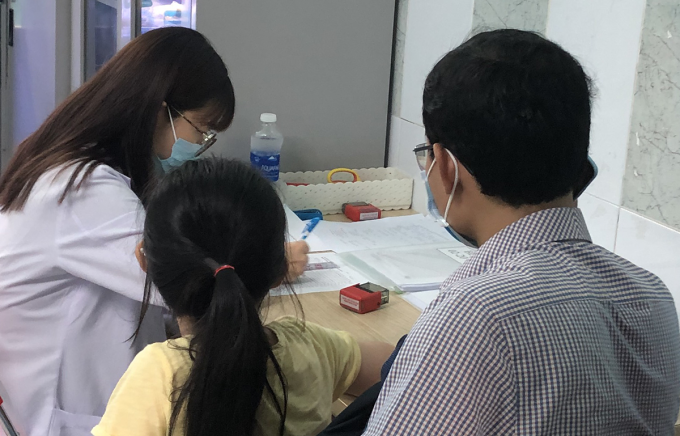Dr. Tran Thi Ngoc Anh, Department of Endocrinology, Nguyen Tri Phuong Hospital (HCMC) said that among the factors affecting height, genetic factors cannot be changed. In particular, cases of slow growth due to lack of growth hormone, according to statistics, in the world, it is estimated to only account for about 1/3,000 - 1/4,000, but this is one of the important causes of slow growth in children and is very difficult to detect.
"In reality, in many cases, when children come to the hospital for examination, their parents have already given them treatment and nutritional intervention before, but there is no improvement. When the cause of slow growth due to growth hormone deficiency is correctly identified and the doctor's treatment regimen is followed, the child's height improves significantly," Dr. Anh shared.

Children's height screening at Nguyen Tri Phuong Hospital
The role of growth hormone in height development
GH is a hormone produced by the pituitary gland in the brain and helps children grow, mainly during puberty. GH plays an important role in the development of the musculoskeletal system, determining the height of the body; at the same time, it also affects the body's metabolic functions including fluid distribution, lipid metabolism, protein, carbohydrates, muscle strength and the cardiovascular system.
GH deficiency is the main cause of stunted growth in children. This condition occurs when the body has problems producing and releasing insufficient growth hormone. Growth hormone deficiency can be congenital or acquired due to damage to the pituitary gland, severe head trauma, brain tumors, or infections such as meningitis and encephalitis. Growth hormone deficiency can be congenital or acquired, occurring at any time. In some cases, the cause of growth hormone deficiency is unknown.
GH deficiency can reduce the rate of growth in height and weight of children compared to children of the same age. Children with growth hormone deficiency will have a shorter height than their age (below 2-3 standard deviations based on the growth chart), slow growth rate (below 1.5 SD or less than 5cm/year). Under normal circumstances, growth hormone promotes the growth of body tissues. Children with partial or complete growth hormone deficiency will not be able to maintain a healthy growth rate.
Best for ages 4-13
According to British doctors, when children are diagnosed with slow growth due to GH deficiency, GH supplementation will be prescribed. The goal of this treatment is to replace the growth hormone deficiency for height development, metabolic activities and general health.
After 3-6 months of treatment, the child will have their height measured again and blood tested to evaluate the results and adjust the dose of medication if necessary. Children who respond to treatment will increase their height by 8-12 cm/year. When they reach puberty, the child will be re-evaluated to see if they should continue to supplement GH or stop supplementing. For GH treatment to be effective, it must be done at the right time, at the right dose, best between the ages of 4-13. If after this time, the child's cartilage closes, using growth hormone will no longer be effective.
GH supplementation is not only indicated for cases of growth hormone deficiency, but is also indicated for treatment in cases of slow growth in children due to chronic kidney failure, children born with low height for gestational age (SGA), and idiopathic dwarfism (GHD, ISS).
According to Dr. Anh, some cases of growth hormone deficiency have been diagnosed and treated promptly, helping to increase height. Normally, newborns are 48-52 cm tall, and in the first year they grow about 20-25 cm, in the second year they grow 12 cm, in the third year they grow 10 cm, and in the fourth year they grow 7 cm. From the age of 4 onwards, parents need to pay more attention to their child's height growth rate.
From 4 to 11 years old, children will grow an average of 4-6 cm/year. When reaching puberty, girls grow about 6-10 cm per year, boys grow from 6.5-11 cm per year. In case children do not reach the height growth milestones according to their age, parents should take their children to see a doctor and screen for slow growth in height early.
If left untreated, children with growth hormone deficiency have an average height of only 135 - 145 cm, much shorter than the maximum height that can be achieved. This not only affects the child's future work and life, but can also affect the child's psychology due to inferiority complex and self-consciousness compared to peers.
Source link




























































































Comment (0)